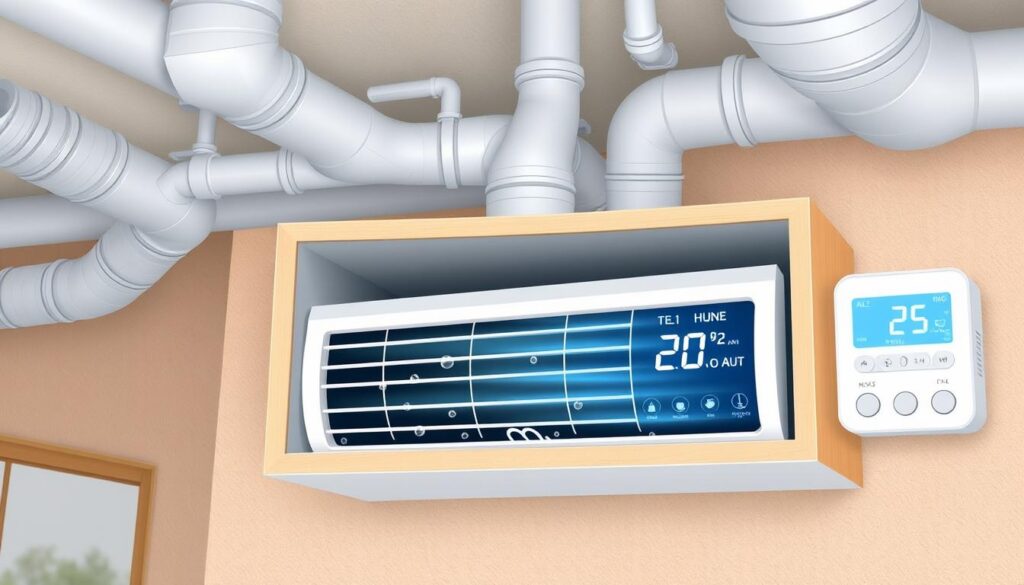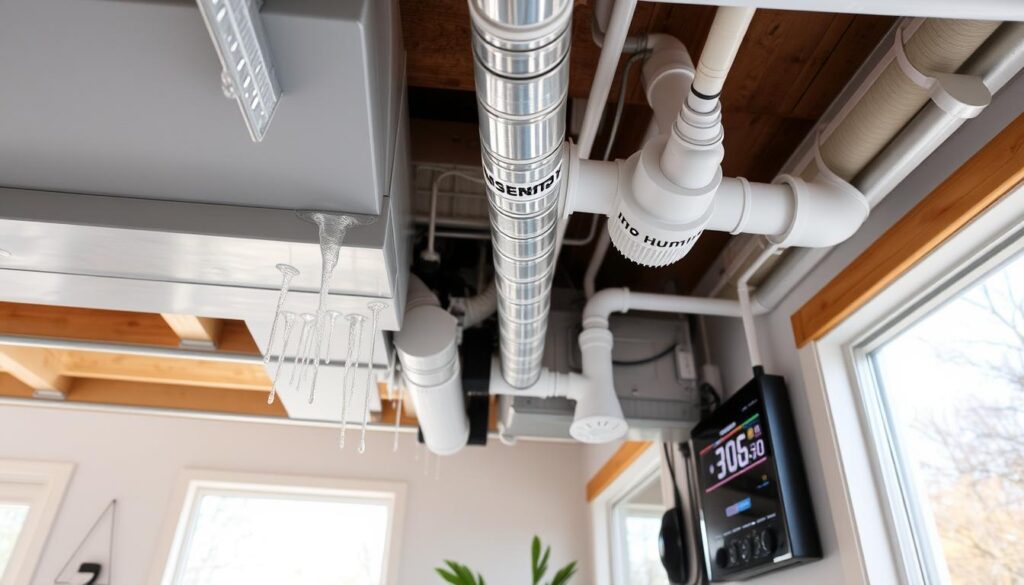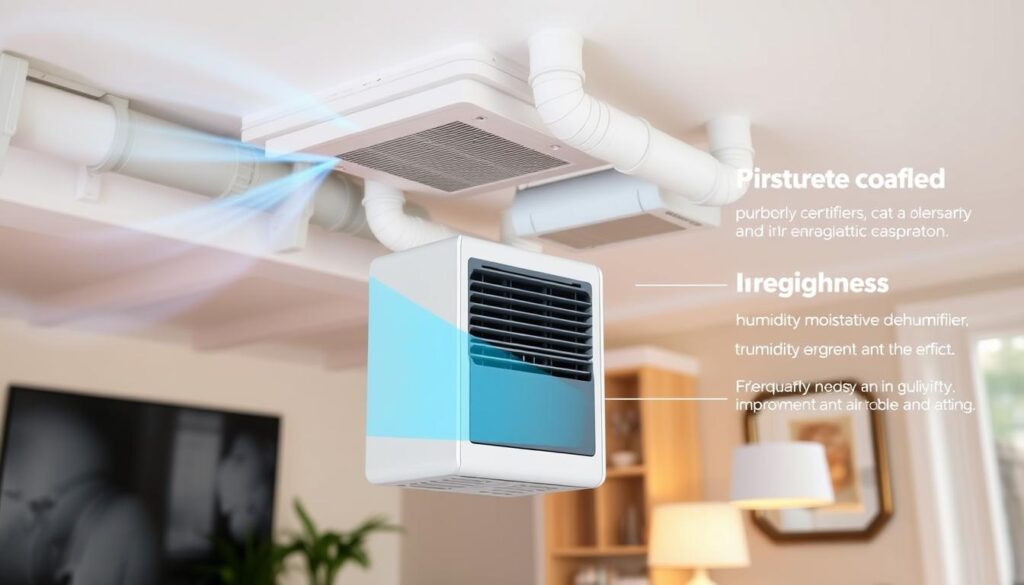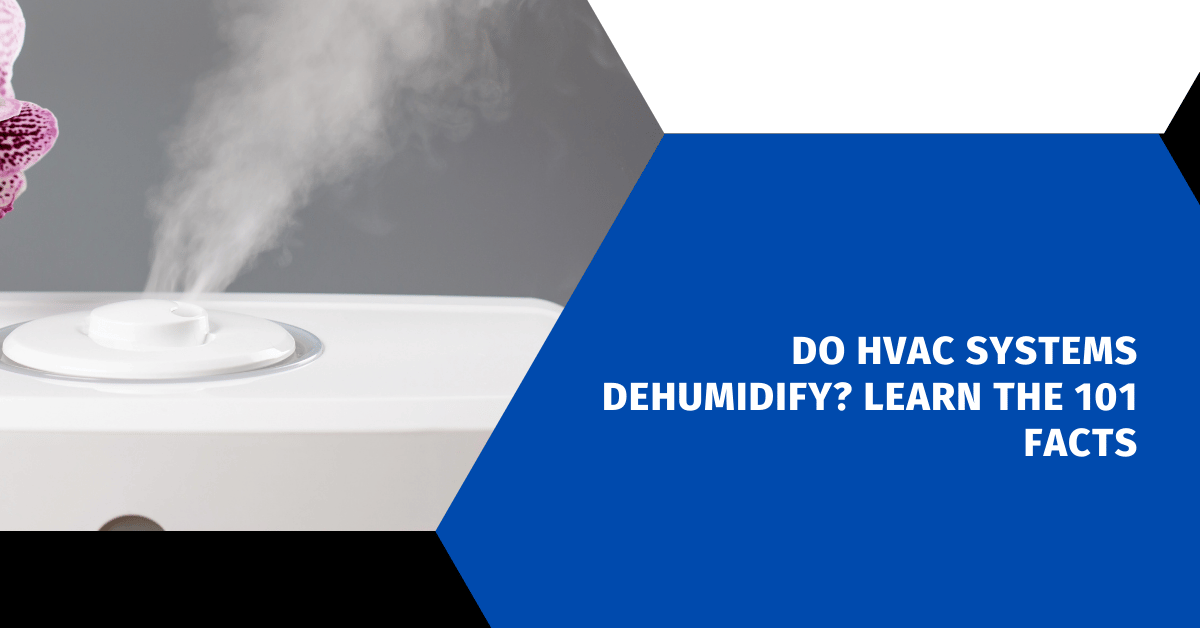Affiliate Disclosure
HVAC Guide Guys is a participant in the Amazon Services LLC Associates Program, an affiliate advertising program designed to provide a means for sites to earn advertising fees by advertising and linking to Amazon.
Do HVAC Systems Dehumidify? As the weather gets warmer, you might wonder if your HVAC system dehumidifies your home. This is a common question, and the answer might surprise you. In the past, HVAC systems cooled the air and also removed moisture. But today’s energy-saving HVAC systems have changed, and their ability to control humidity is debated.
We’ll look into how HVAC systems and dehumidification work together. We’ll compare old and new technologies and talk about ways to keep your home’s humidity just right. Knowing how HVAC systems handle moisture can help make your home more comfortable and healthy for your family.

Key Takeaways
- HVAC systems have evolved over time, with modern energy-efficient models potentially not providing adequate dehumidification.
- High indoor humidity can lead to discomfort, mold growth, and other health issues, requiring homeowners to use additional dehumidification measures.
- Integrating a dehumidifier into an HVAC system can eliminate the need for manual emptying and improve indoor air quality.
- Proper humidity control can extend the lifespan of HVAC systems, reduce energy costs, and create a more comfortable living environment.
- Achieving the right balance between energy efficiency and humidity control is crucial for maintaining a healthy and comfortable home.
Table of Contents
Understanding HVAC Systems and Dehumidification: Past vs Present
Old HVAC systems cooled spaces and dehumidified air as a side effect. They ran long, removing moisture from homes. But, new HVAC systems cool faster and use less energy. They might not remove moisture as well.
How Traditional HVAC Systems Managed Humidity
Old HVAC systems weren’t all about saving energy. They ran longer, which helped keep homes dry. This was especially true in humid areas.
Modern HVAC System Efficiency Changes
New HVAC systems cool quickly but don’t run as long. They save energy but might not control humidity well. This can make homes feel more humid.
The Evolution of Cooling Technology
New cooling tech, like LED bulbs, has changed HVAC systems. LEDs don’t heat up like old bulbs. This means HVAC systems don’t have to work as hard, affecting their moisture removal.
Modern HVAC systems are more energy-efficient but don’t dehumidify as well. This can lead to mold, bad smells, and health problems. Homeowners need new solutions, like dehumidifiers, to keep air quality good.
Do HVAC Systems Dehumidify: The Truth About Modern Systems
Modern HVAC systems are made for cooling, not dehumidifying. They run for shorter times, which means they don’t remove moisture as well as older systems. Now, we can’t count on them to cool and lower humidity at the same time.
Older HVAC systems could handle humidity better. But, today’s focus on saving energy has made them less effective at dehumidifying. This leaves many homeowners struggling to keep their homes comfortable and dry.
The American Society of Heating, Refrigeration and Air-Conditioning Engineers (ASHRAE) says modern air conditioners do dehumidify, but it’s not their main job. Sometimes, these systems can’t handle humidity well enough, leading to comfort or mold issues.
Some high-end HVAC systems have better dehumidification features. But, if your system can’t handle it, you might need a separate dehumidifier to help out.
Getting a dehumidifier can save energy by reducing how often your HVAC system runs. Logis-Tech has different dehumidifiers to fit your needs. They can work with or replace your current system, offering a cost-effective solution.
Explore Our HVAC Shop
Looking for top-rated HVAC tools, parts, and accessories? Visit our shop and find the perfect solution for your needs.
Visit the ShopThe Science Behind HVAC Dehumidification Process
It’s important to know how HVAC dehumidification works to keep indoor humidity right. This process is all about the relationship between dew point and air temperature. It also involves the condensation that happens inside the system.
Dew Point and Air Temperature Relationship
The dew point is when air can’t hold its moisture anymore, leading to condensation. HVAC systems aim to keep air temperature below the dew point. This lets them remove excess moisture from the air.
This makes the air’s relative humidity (RH) closer to the dew point. This creates a more comfortable and healthier environment. It also helps prevent mold and mildew.
Condensation Process in HVAC Systems
When air hits the HVAC system’s cold coils, its temperature drops below the dew point. This causes the water vapor in the air to condense. The water then gets collected and drained, dehumidifying the air.
The colder the coils, the more moisture they can pull out. This makes the dehumidification process more effective.
Relative Humidity Control Mechanisms
HVAC systems use different ways to control humidity. These include:
- Refrigeration-based dehumidifiers, which cool the air to remove moisture
- Desiccant-based dehumidifiers, which use absorbent materials to capture and remove humidity
- Ventilation and air exchange systems, which introduce drier outdoor air to dilute indoor humidity
Understanding the HVAC dehumidification process helps homeowners and building managers. They can make sure their systems work well. This keeps the indoor environment comfortable and healthy.
Why Modern HVAC Systems May Not Effectively Dehumidify
Modern HVAC systems are great at cooling, but they might not remove humidity well. This is because they focus on quick cooling rather than controlling humidity.
New, efficient HVAC units cool fast but don’t dehumidify enough. They might not run long enough to remove all the moisture from the air. This can cause high humidity, leading to mold and dust mites.
It’s also important to size your HVAC system right for humidity control. An oversized system cools too fast, not dehumidifying enough. An undersized system can’t handle moisture, causing the same issue.
| HVAC System Efficiency | Humidity Control Implications |
|---|---|
| Older, less efficient models | Run longer, potentially better at removing excess moisture |
| Newer, high-efficiency models | Run shorter, may not effectively dehumidify living spaces |
To keep humidity levels right, make sure your HVAC system is the right size and well-maintained. Change filters often, get professional tune-ups, and sometimes add a dehumidifier. This will help your HVAC system handle moisture better.
Explore Our HVAC Shop
Looking for top-rated HVAC tools, parts, and accessories? Visit our shop and find the perfect solution for your needs.
Visit the ShopCommon Signs of Insufficient Dehumidification in Your Home
Keeping the right humidity inside is key for your comfort and health. Many HVAC systems can’t handle dehumidifying well. This leads to problems. Knowing the signs of high humidity is crucial to fix it fast.
Physical Indicators of High Indoor Humidity
Look out for these signs in your home:
- Condensation on windows, walls, or ceilings
- Damp spots or mold growth on surfaces
- A general feeling of stickiness or dampness in the air
- Musty odors or a stuffy, uncomfortable atmosphere
Impact on Indoor Air Quality
Not enough dehumidification hurts your air quality. This can lead to:
- More allergens like mold spores, dust mites, and mildew
- Respiratory issues, including asthma, allergies, and infections
- Potential damage to materials, furniture, and belongings
Fixing high humidity with HVAC humidity management is vital. It keeps your home healthy and comfy.
“Excess moisture in the air can lead to condensation on windows, walls, and pipes. This can cause peeling paint, rotting wood, and structural damage.”
The Role of HVAC Systems in Moisture Management
Your HVAC system is key to keeping your home’s humidity in check. Even though newer systems might not dehumidify as well as older ones, they still play a big part in managing moisture.
It’s crucial to know what your HVAC can and can’t do to keep humidity levels right. The ideal humidity in your home should be between 30% and 50%. Your HVAC helps control this by cooling, dehumidifying, and ventilating the air.
In summer, your air conditioner cools and dries the air in your home. This stops moisture from building up, which can cause mold and bad smells. But in winter, your HVAC might dry out the air too much.
To get better at controlling humidity, think about adding a whole-house dehumidifier or humidifier. These work with your HVAC to keep the moisture just right, making your home more comfortable and healthy.
Keeping your HVAC in good shape, like changing air filters, can also help it manage humidity better. By knowing how your HVAC affects moisture, you can make your home more comfy and save on energy.

“Proper humidity control through HVAC systems can lead to enhanced comfort and improved energy efficiency, resulting in lower energy bills.”
Solutions for Enhanced Humidity Control
Keeping the right humidity in your home is key for comfort and health. It also helps your HVAC system work better. Luckily, there are many ways to control humidity better.
Whole-House Dehumidifier Integration
Adding a whole-house dehumidifier to your HVAC system can really help with moisture. These systems work with your HVAC to pull out extra moisture. They drain it into the sewer or outside.
This method makes sure humidity is even everywhere in your home. It also makes your HVAC system more energy-efficient.
Smart HVAC Controls and Settings
Using smart HVAC controls can also improve humidity in your home. You can adjust settings to keep humidity between 40% and 60%. Experts say this is the best range.
Don’t forget to keep your HVAC system in good shape. Change filters and clean coils regularly. This helps your system dehumidify better.
| Metric | Optimal Range | Implications of Imbalance |
|---|---|---|
| Relative Humidity (RH) | 40% – 60% | Too much humidity can cause mold and damage. Too little can make breathing hard and feel uncomfortable. |
By using whole-house dehumidifiers and smart HVAC controls, you can control humidity well. This makes your home comfortable and healthy. It also makes your HVAC system more efficient.
Explore Our HVAC Shop
Looking for top-rated HVAC tools, parts, and accessories? Visit our shop and find the perfect solution for your needs.
Visit the ShopBenefits of Adding a Dedicated Dehumidifier to Your HVAC System
Keeping your indoor air quality good is key for your health and comfort. Adding a dedicated dehumidifier to your HVAC system offers many benefits. It helps control humidity, making your HVAC system work better, last longer, and improve your home’s health.
A dedicated dehumidifier is great at removing extra moisture from the air. In places like Atlanta, where it’s often humid, your HVAC system might struggle. But a whole-house dehumidifier can help keep your home’s humidity between 40-60%, which is best for air quality and comfort.
By easing the load on your HVAC system, a dedicated dehumidifier can also save you money. When the air is less humid, your air conditioner works better. This lets you keep your home comfortable while using less energy, which can cut down your bills a lot.
Also, a whole-house dehumidifier can make your indoor air cleaner. It stops mold, mildew, dust mites, and other allergens from growing in humid air. This is good for people with breathing problems like asthma or allergies, as it can make their symptoms better and their life easier.
Getting a dedicated dehumidifier is easy, and it’s a smart investment. It makes your HVAC system work better, last longer, and improves your air quality. By focusing on controlling humidity, you can make your home healthier and more comfortable for you and your family.

| Benefit | Description |
|---|---|
| Improved HVAC Efficiency | A whole-house dehumidifier can reduce the strain on your HVAC system, allowing it to work more efficiently and potentially saving you money on energy bills. |
| Extended HVAC Lifespan | By reducing the workload on your HVAC system, a dedicated dehumidifier can help extend its lifespan, saving you from costly repairs or replacement. |
| Enhanced Indoor Air Quality | Dehumidifiers help control moisture levels, which can inhibit the growth of mold, mildew, dust mites, and other allergens, improving the overall indoor air quality. |
| Improved Comfort | Maintaining optimal humidity levels can create a more comfortable living environment, allowing you to feel cooler and more refreshed. |
“Properly sized air conditioners can effectively eliminate excess humidity, except during shoulder seasons when ACs may not run frequently enough.”
In conclusion, adding a dedicated dehumidifier to your HVAC system brings many benefits. It improves energy efficiency, air quality, and comfort. By controlling humidity, you can make your home healthier and more enjoyable for your family.
Energy Efficiency and Humidity Control Balance
Keeping the right balance between HVAC energy efficiency and humidity control is tricky. Energy-saving HVAC systems can cut down on utility bills. Yet, they might not keep humidity levels just right, between 30-50%. This is because modern cooling tech focuses more on cooling than on removing moisture.
It’s important to manage humidity well for your comfort and the health of your HVAC system. Too much humidity can make your system use more energy, while too little can make it work harder to heat your home. Finding the perfect mix between energy saving and humidity control is key to a comfortable and healthy home.
| Metric | Optimal Range | Potential Issues |
|---|---|---|
| Indoor Humidity | 30% – 50% | High humidity: Increased energy use, mold growth Low humidity: Dry air, static electricity, respiratory issues |
| HVAC Energy Efficiency | High | Compromised dehumidification, reduced comfort |
To find the perfect balance, think about adding whole-house humidifiers and dehumidifiers to your HVAC system. These tools work with your cooling and heating to keep moisture levels just right, all year. Also, regular HVAC upkeep, like changing filters and checking ducts, helps your system last longer and use less energy.
By focusing on both energy efficiency and humidity reduction, you can make your home comfortable, healthy, and energy-smart for your family to enjoy all year.
Explore Our HVAC Shop
Looking for top-rated HVAC tools, parts, and accessories? Visit our shop and find the perfect solution for your needs.
Visit the ShopBest Practices for Optimal HVAC Humidity Management
Keeping the right humidity inside is key for your comfort and health. It also helps your HVAC system work better. The best humidity level is between 30% and 50% RH. This can help you save on cooling costs and prevent mold and respiratory problems.
To manage humidity well, follow these tips:
- Regular HVAC maintenance: Keep your system in top shape by changing air filters and cleaning vents.
- Proper system sizing: Make sure your HVAC fits your home right to control humidity well.
- Supplemental dehumidification: Use a whole-house dehumidifier or a VRF system for better control over humidity.
- Fan speed adjustment: Change your HVAC’s fan speed to improve air flow and dehumidify better.
- Programmable thermostat: Use a programmable thermostat to adjust settings automatically based on your needs.
- Proper ventilation: Make sure your home has good ventilation to avoid moisture buildup.
By following these tips, you can manage HVAC humidity control and HVAC system moisture removal effectively. This ensures your home is comfortable, has good air quality, and uses energy wisely.
| Humidity Level | Potential Issues | Recommended Actions |
|---|---|---|
| Below 30% RH | Dry skin, respiratory problems, static electricity | Install a humidifier |
| 30-50% RH | Optimal indoor comfort and air quality | Maintain HVAC system and settings |
| Above 50% RH | Mold, mildew, increased energy consumption | Add a dehumidifier or upgrade HVAC system |
By following these tips, you can keep your HVAC system at the perfect humidity level. This promotes comfort, health, and energy efficiency in your home.
Conclusion
Modern HVAC systems might not dehumidify as well as older ones. But, knowing their limits and using extra solutions can help keep humidity levels right. It’s important to balance HVAC dehumidification, indoor air quality, and humidity control for a comfy, healthy home.
Homeowners should think about what they need and talk to HVAC pros. They can help figure out the best way to handle indoor humidity.
Good ventilation, sealing windows and doors, regular HVAC checks, and using dehumidifiers or heat pumps help control humidity. Knowing how HVAC systems handle moisture lets you take steps to keep your home comfy and healthy. Plus, it helps save energy.
For a healthy, comfy, and energy-saving home, you need a good plan for HVAC dehumidification and air quality. Stay informed and work with HVAC experts. This way, you can get the right mix of temperature, humidity, and air quality in your home.

